Let's Reboot... Command And Conquer
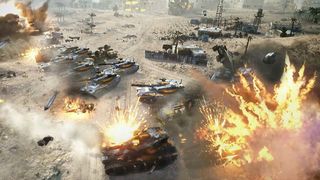
“Let's Reboot” takes a look back at a classic in need of a new outing or a beloved series gone stale and asks how it might be best redesigned or given a kick up the backside for today's gaming audience. The Rules: Assume a free hand, and a decent budget, but realistic technology and expectations. This week's sacred cow – an attempt to make a revamped classic RTS, with a Nod or two to the old.
There was a time when Command and Conquer essentially was PC strategy - earlier games like Dune 2 and Herzog Zwei simply swept away in the face of the words "C&C clone". Now, it's at best a dusty franchise, with reinvention on the way in the form of a massive free-to-play online version , but the regular single-player side of things comprehensively killed by the abysmal Tiberian Twilight. Could there still be scope to bring back the story-driven core of the franchise though? Maybe so! Let's reboot...
As ever, it's probably best to start with what went wrong. For C&C, there were a few key elements - the biggest that the basic game was stuck in a rut, with C&C 4's attempt to break out of it just not being all that much fun. Another big one though was that the Tiberium storyline was simply too fast. It took the world from a game set tomorrow, to ridiculous SF nonsense with mutants and entire continents covered in alien crystal and lots of other stuff that made its universe unrecognisable. The Red Alert series kept things more grounded there, and honestly I thought it was great, but it was arguably a little too silly for many - even if those people did often only have about 1/3 of the average human soul.
For our reboot, we're going to take a bit of both. We need something striking. We need something with character. We need something a bit different. We need a new timeline. We need a new war .
And what else could it be, but the United States vs. Europe? Oh yes. US vs Them.
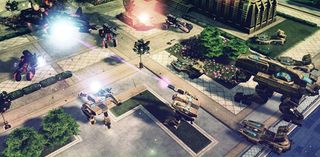
It's not World War 3 yet though, but a fight primarily being played out through proxies. Both are trying to get other countries on side in advance of a war both seem convinced is going to happen, even if in public they're making a show of politeness and keeping their knives behind their backs. Unlike with C&C's Tiberium, the exact reason for the sudden animosity is a mystery; one that our heroes have to slowly uncover as this Cold War becomes defrosted. Rather than good and evil campaigns, this time we play both sides and a few one-shot missions here and there - swapping and changing over the course of a single story that allows for the mechanics to shift more convincingly between quick skirmishing and having entire fixed armies to control. Where a big assault might have been a cut-scene before, now we play it, and see the results directly from the point of view of the other side in the next mission.
Like the C&C games of old, of course cut-scenes have to be FMV. It offers a narmy charm, with each side here alternating between distinct styles - the Americans fighting an 80s style action movie, while the British take a more detatched, Men From From The Ministry type big picture view, and other countries have their own styles as we blip around the world and other people get caught up in the fight. The characters will actually do more than just stand in front of a blue screen though, as the lack of any actual action got incredibly boring in the last few games. There's no point trying to tell a serious, gritty story - but regular moments of actual character awesomeness are needed, not just camp. We're talking a President who can take on assassins hand-to-hand, civil servants who don't even blink at explosions while sipping tea, and the nations of the world playing off their stereotypes. Schlock, basically, of the kind where even people who don't play the game still head to YouTube to enjoy the cut-scenes.
PC Gamer Newsletter
Sign up to get the best content of the week, and great gaming deals, as picked by the editors.

As for the action itself? That has to be taken a little more seriously.
For starters, it won't be classic C&C. Even if the last attempt to break away failed, the raw mechanics need updating. The whole "GDI Laboratory for sale, located in middle of GDI base, buyer collects" thing is silly, as is mass producing engines of war on the battlefield. At the same time though, being stuck entirely with a handful of units tends to turn missions into puzzles more than tactical challenges.
As a compromise, there will be base building, but it'll be much simplified. Instead of full-on fortified bases, which can only exist in missions where their existence makes sense, player bases will be more outposts. Some missions will have a fixed team. Others are based on a reinforcements system, where instead of spending cash specifically, you get a pool of points that refreshes every few minutes and can be expanded over the course of a game with specific buildings or achievements like taking out an enemy outpost. Using this, you make your shopping list for the next wave - something like a tank costing more than a few guys, and the top level gear not being available until your pool has been sufficiently expanded - and your units show up as a group when the timer ticks down. Points can't be saved up between waves, encouraging liberal spending and actually getting a new set of toys each reinforcement tick.
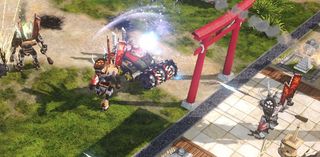
Each side though plays things a bit differently. A crack team of specialists for instance - think a whole team of Tanya types - will get no backup, because they shouldn't need it. Others might revolve around asynchronicity - a fixed army that has to move quickly, or be slowly defeated by a smaller one whose regular reinforcements of basic troops will slowly erode them away like waves against a beach. Much like Starcraft 2, everything in the single-player is balanced for that, with a fairer set of rules in place for the equally necessary multiplayer action. But that goes without saying for this genre.
Later, a second mechanic enters the fray, with the discovery of another Tiberium like substance. It's not actually Tiberium, because that story is over, but a limited, non-respawning resource on the map that can specifically be gathered up and used to purchase super-weapons. Unlike the classic production facilities, these actually are on the map so that the other side can destroy or capture them. Think weapons like the Chronosphere or Nuke, which take time to build and prepare for battle, but have devastating effects. Starving the other player of the necessary material can be just as effective a tactic as actually building one, and it also works as an upgrade resource for other units. Will you go for the nuke, or spend it on upgrading your soldiers to be individually more deadly? That's another tactical decision.
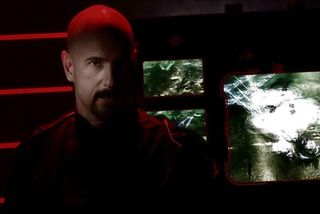
What exactly is this mysterious new substance? It has a technical name, but you'll come to know it as Detritus - the ashes of a war that's yet to be fought, rippling back in time from future battlefields its own discovery will ultimately cause. What our heroes are finding are the scraps from small skirmishes around the world, with both the US and Europe stockpiling the stuff from the epic world war they led to - already hard at work creating the kind of devices that make the game's superweapons look like children's toys.
Neither is evil, or even the bad guy. Both have hawks, and both have doves. Both sides simply believe that the upcoming war is inevitable, and that they need to prepare - even if that preparation means starting it. Uncovering the truth, with the additional perspective that the future isn't yet written in stone, our heroes' final objective is to come together and prevent the first strike that will lock the world into the apocalyptic time loop. To be an informal sort of... oh... global defense initiative, if you will.
But will one of the sides blink first? And if so, are you a bad enough dude to assassinate the President?
Also, has anyone noticed that Russia has been worryingly quiet during all of this? Just saying.
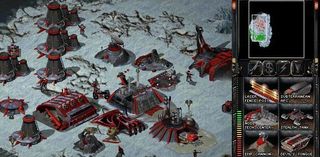
Obviously, it's all very silly stuff - but that's part of the charm of C&C. It's a series that needs to be larger than life, not least because its mechanics and premises are ridiculous. Generals never appealed to me, simply because while it wasn't exactly realistic, it still felt too grounded to convey the madness of people being ridiculous and battles fought with the mindset that overkill is precisely enough kill. The new version may well have that in the action, but there's not much chance it'll be wrapped in all the kitsch charm and B-Movie acting that made the series so much fun both on and off the battlefield.
Those elements might not be something worth adding to a new game, or be better done by CG, but I miss them, so they're staying. You wouldn't want Tex Murphy without Chris Jones in his fedora. Likewise, C&C just isn't the same without a few hey-it's-that-guy actors hamming it up in front of a camera. It might be tough to budget or justify for an actual game, especially with gamer tastes as they are but in the realms of a thought experiment, we can do whatever the heck we like. Anything, that is, except add orcs to help fight the humans. Probably better save those for that other RTS.
Most Popular




